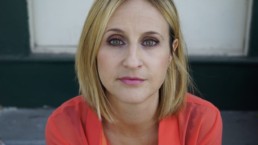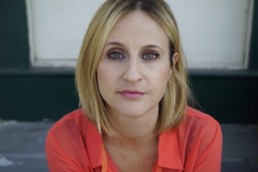‘Under the Gun’ Director Stephanie Soechtig Talks Gun Control in New Documentary
This is a custom heading element.
This month acclaimed documentary director Stephanie Soechtig (Fed Up, Tapped) re-teams with executive producer Katie Couric to thoroughly investigate why gun violence is rampant as ever and any attempt at gun control is met with massive backlash. What is keeping the two sides of the debate – those favoring stricter gun control vs. second amendment purists – from finding a compromise? This thorough investigation is an insight into American culture at large and the levels at which the NRA and their lobbyists will go to have their way. It also gives humanity to the facts by introducing us to the families affected by national tragedies in Aurora, Newton, Isla Vista, and Tucson, as well as daily gun violence in Chicago. It’s a must-see documentary that will spark the conversation even further, and give advocates even more ammunition in the form of facts and knowledge. After premiering the film at Sundance in January, we interviewed Soechtig about the film, the topic, the release strategy, and more:
What brought you to this topic after finishing your last documentary, “Fed Up”?
It was entirely Katie Couric’s idea! She called me while we were promoting “Fed Up” – that film came out in theaters May 9, 2014 and on May 23rd the Isla Vista shooting happened, and in between that May 9th and May 23rd window we kept crossing paths. She was like, ‘I want to talk to you, I have a great idea for a movie.’ When Isla Vista happened, she said, ‘I don’t understand how this keeps happening.’ My initial reaction was actually the same as it was for “Fed Up,” this story was already part of the daily news cycle, how interesting could this be? I started looking into it and little by little, I realized the daily news cycle had only scratched the surface of this story. We set out to create a more comprehensive and holistic look at the picture by making it character-driven but also showing the history and the politics juxtaposed with these personal stories.
That was fascinating to me, the parallels between the lobbying and manipulation the NRA is doing compared to the tobacco industry 50 years ago.
Yeah, true.
With all of the people affected by gun violence, how did you find your subjects?
We wanted to look at the major shootings that had occurred at that time. Obviously, we couldn’t do all of them, so Virginia Tech is noticeably absent. I’m from Brookfield, Connecticut which is the town that neighbors Newtown. Katie had interviewed the Barden family from Newtown just days after they lost their 7-year-old son Daniel, and we knew there was more of their story to tell so [including them] was obvious. Because Isla Vista is what prompted the film in the first place, Rich Martinez was one of the first people that we cast, and we met up with him just four months after he lost his son Christopher. [During our research], we were noticing that there were so many mass shootings in Chicago that weren’t getting covered. People were calling it ‘Another night in Chicago.’ We wondered why they weren’t getting the same attention as a Newtown or Aurora, Co. We wanted to look into that, so we went out to Chicago and met with a larger group of people and then decided to focus on the Bosley family specifically because they really paralleled the Newtown family. I liked the idea of juxtaposing them because the country obviously reacted completely differently to their loss than they did to the Sandy Hook tragedy. Why? Why are we so outraged when it happens in white suburbia yet we remain silent in Chicago? That’s why we chose that family.
That was so eye-opening as a viewer, seeing the way the news uses words to describe certain events as either routine violence vs an actual tragedy.
The actual shooting feels the same, whether you’re in Connecticut or Chicago, yet we as a nation have decided that it’s different somehow. It’s really sad when we don’t approach situations the same way. That’s something that I hope people reflect upon when they leave.
Did you face any resistance along the way while making the film?
It was difficult to get gun owners to talk to us, and it was really important to represent gun owners because, as we say in the film, the NRA only represents 5% of gun owners. We really wanted to speak to the other 95% but there is some fear out there from gun owners not wanting to enter this debate because of the fringe minority. You can even see it on our Facebook page now, there are people who say ‘I open carry, but I believe in background checks’ and they are getting attacked by other people. For that reason, some people were reluctant to talk to us.
How is creating a feature documentary a viable way to create a social change?
I think with an issue this complicated, it’s been boiled down to soundbites for far too long and I think that’s why we’ve all been misled. It needed this length of a film– I have two more hours that I didn’t include in this film – to truly understand the nuances and complexities of the situation.
Can you talk about how the film is being distributed?
We had a few offers from various distributors at Sundance but was really appealing about the Epix/Lionsgate deal is that Epix was going to show the film for free over a “preview weekend,” so anyone with cable or internet access can watch the film for free on May 15th. We’re on iTunes, Amazon, and Cable VOD May 31st.
After watching the film, what can viewers do to help the movement and the cause?
On the website, we’re going to have a ‘Take Action’ campaign where people can easily get involved.
What advice do you have for aspiring documentary filmmakers who want to make films with a social impact?
Don’t let anyone tell you that you can’t do it. It requires a tremendous amount of grit and determination to make a documentary and that can be really discouraging at times. I think persistence and good intentions makes the things you do rise to the top. For “Under the Gun,” the intention was these families and how can something good come out of their loss. When you remind yourself of the underlying intention, I think it motivates you in a way that leads to the best film you can make.
H. Nelson Tracey
Nelson is a film director and editor from Denver based in Los Angeles. In addition to writing for Cinemacy, he has worked on multiple high profile documentaries and curates the YouTube channel "Hint of Film." You can check out more of his work at his website, hnelsontracey.com


